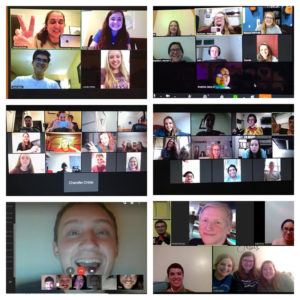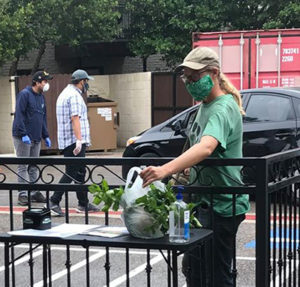Baptist Student Ministries at universities in Texas transitioned from a continuous on-campus presence to an off-campus and almost entirely virtual approach.
Many college students left their campus for spring break and then were informed their schools would not open back because of COVID-19.
Since then, schools have announced they plan to return to campus in the fall.
“There’s nothing going on on-campus right now,” said Texas Tech University Baptist Student Ministries Director Jeff Kennon. “I could go up to the building, but nobody else would come in.”
At first, Texas Tech announced plans to extend spring break for students, then said classes would go online until the crisis was over.
But by the end of April the university informed students they would not return to on-campus classes for the academic year, Kennon said.
Brainstorming idea
In a matter of days, students and the ministers who worked with them halted plans and began brainstorming ways to continue to meet some of their goals through other methods.
Kennon canceled mission trips and on-campus outreach ministries, as well as times of worship and fellowship at the new student center, which BSM just inaugurated last fall.
Other activities such as leadership development and Bible study groups continue through online video calls, he added.
Sign up for our weekly edition and get all our headlines in your inbox on Thursdays
“The only thing we can do right now is to embrace this,” Kennon observed. “This is the way it is. So, let’s continue to do ministry and see what happens.”
While Tech BSM already used online tools for ministry, Kennon said, this season is one of learning new ways of ministering to others, many of whom face new challenges.
New opportunities to minister
Using more technology for communication opened up interactions many did not have before, he said.
During a video conference call with international students, a student from China who formerly attended Texas Tech also joined the call.
After the call was over, she suggested Kennon consider participating in a class on Chinese culture she teaches.
Kennon accepted the invitation and interacted with students who then also wanted to learn about the culture.
Opportunities like that have opened up to other students who are part of the BSM at Tech and the classes this former student teaches.
“If we continue to be faithful, then other opportunities will open up,” said Kennon. “We now have an opportunity with students in China, which is something we couldn’t have imagined. So yeah, I think we only have to go along with this.”
Crossing borders
The Texas A&M University BSM has seen its ministry cross borders as well. While the majority of American students went home, most of the international students were unable to return home and had to stay in College Station.
Many students in the Aggie BSM quickly understood the severity of COVID-19 after two students who went to Beach Reach during spring break contracted the virus.
But many international students, specially those from Asia, had been on edge since the beginning of the semester, and many students from China began wearing masks in January, Aggie BSM Director Joel Bratcher said.
Many students from India also live around the BSM building and they have rarely left their homes.

Person-to-person interactions have dropped off, but relationships with previous students who are now back home have been rekindled through video calls.
“It’s given us the opportunity to go in deeper in ways we could not have done before,” Bratcher said.
One student—who became a Christian a short while before she went home to Japan—has kept in touch with leadership at the Aggie BSM. Through the communication they have maintained, the student has stayed connected with a Christian community as she begins looking for one back home.
A former student from Mexico, who had studied at A&M and teaches in Mexico City now, began participating in one of the Aggie BSM video conference Bible studies. After the study was over, she said she felt God’s call to begin a Bible study with her peers at the university in Mexico.
“Because of what we have learned, we have noticed it is a lot more doable to continue meeting with international students after they have gone back home,” Bratcher commented.
Reinforced the importance of relationships
Leaders of the Aggie BSM now understand they can minister more to former students who have gone back home and mentor them through some transitions, he said.
Fear and change have not affected the commitment of student leaders at the BSM, Bratcher noted. Student leaders quickly stepped up and continued working with their own groups doing things like Bible study while everyone is at home, Bratcher said.
Though Bratcher also said he and his team have had to learn to work almost exclusively through digital communication, he pointed out many students have opened up more spiritually during this season.
Support between other state BSM directors and national Baptist collegiate ministries has increased, Bratcher said. Directors are more open to share ideas, he added.
“I think this time has reinforced to me the importance of relationships,” Bratcher said. “We can try to do a lot with big groups of people, but if we don’t look for that personal relationship with each other, then we may not grow together as much.”
Expanding a ministry to meet needs
The BSM at the University of Texas at Rio Grande Valley expanded an existing ministry in response to the COVID-19 crisis.
BSM Director Robert Rueda began a “pay-what-you-can” deli right next to the student center last year. Rueda and his team decided the deli would stay open two days a week to continue serving students through the COVID-19 pandemic.

Their ministry of providing food for students during this crisis also now involves a drive-through free lunch on Thursdays, which not only serves students at UTRGV but also their families.
“It has been great to see students and their families coming together and getting their meals. Then we pray for them and send them on their way,” said Rueda.
The university noticed what the BSM there was doing and invited the collegiate ministry to partner with the school and increase those efforts to feed students.
On Fridays, students and their families pay what they can for fresh vegetables and fruits.
When the university realized many of the students didn’t know how to cook fresh produce or include it in their meal planning, UTRGV began making how-to videos with recipes and step-by-step instructions, Rueda said.
“We are actually doing more than when we were seeing each other,” Rueda said. “Before, we just did the Bible studies, leadership development and the typical student ministry you see in other places. But now, we are helping feed students and their families.”
‘Pandemic does not stop ministry’
The deli and fresh produce distribution follow state and local health protocols and recommendations to limit contact between servers and clients. So, a lot of planning and administration is required for the team to provide those services. Rueda said.
“The work of campus missionaries, interns and volunteers has made all of this possible,” Rueda said. “You have to stay on top of things 24/7 and keep everyone safe. But it has been good to see how the team has come together to show God’s love in a tangible way.”
Rueda has directed BSM efforts at both the Edinburg and Brownsville campuses of UTRGV. So, efforts to feed students in both towns means the BSM serves about 400 students every week.
While a lot of thinking and learning has been required, Rueda hopes this change will bring new opportunities of ministry in schools across the state.
“Pandemic does not stop ministry. It can actually open up more opportunities,” Rueda said.
Ministries must learn to wait, see the need and then pray so that they can serve as tools to meet those needs, he explained.
While universities make plans to return to on-campus instruction in the fall, and everyone involved appears eager to return to normal, Rueda thinks BSMs and churches must take this time to see everything with new eyes.
“We used to open the doors of the church and expect people to come,” Rueda said. “But maybe what we need to be aware of is how other doors in society are opening and how we’re the ones who need to go through them.”
















We seek to connect God’s story and God’s people around the world. To learn more about God’s story, click here.
Send comments and feedback to Eric Black, our editor. For comments to be published, please specify “letter to the editor.” Maximum length for publication is 300 words.